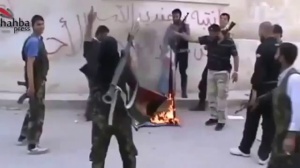 From:
From:

YOUNG DANCER JAILED BY ISRAEL FOR TAKING PART IN PROTEST
By Charlotte Kates. Beirut. 13 February 2015
Lina Khattab, 18, is in her first year of media studies at Birzeit University in the occupied West Bank. An accomplished dancer, she is a member of the renowned troupe El-Funoun.
She was arrested by the Israeli military on 13 December as she joined fellow university students in a march to Israel’s Ofer prison, which holds Palestinian political prisoners.
El-Funoun has produced a video of scenes from her arrest spliced with some of her performances with the troupe, which specializes in the traditional Palestinian dance dabke.
Khattab has now been imprisoned for nearly two months and brought before the military court at Ofer nine times. Her last hearing on 25 January was a closed session; no family or observers were allowed to enter the military court. (Full story.)
ISRAEL SENTENCES PALESTINIAN TEEN LINA KHATTAB TO 6 MONTHS IN PRISON FOR PROTESTING
By Ben Norton, February 18, 2015
_________________________________________
From:

AMERICAN JEWS, SPEAK OUT AGAINST NETANYAHU’S POLICIES
Benjy Cannon
Feb. 18, 2015
The Israeli prime minister and the majority of U.S. Jews fundamentally disagree on key issues. The time has come for American Jewish institutions to address this tension.
Prime Minister Benjamin Netanyahu’s planned speech before Congress – organized behind President Obama’s back – has uncharacteristically split the Jewish communal establishment. Yet the controversy over the speech exposes a tension that has been brewing below the surface for years. The fact is that when it comes to politics, values and the key issues that will decide Israel’s future, Netanyahu and the majority of American Jews fundamentally disagree. The time has come for American Jewish institutions to accept and address that important tension.
The speech, and Netanyahu’s intransigent refusal to back down from it, have created a firestorm of criticism, coming from such mainstream Jewish leaders as Abe Foxman of the Anti-Defamation League and Rabbi Rick Jacobs of the Union for Reform Judaism. (Full story.)
________________________
ISIS AND ISRAEL: ALLIES AGAINST A PALESTINIAN STATE
Sep 10 2014
By Jonathan Cook – Nazareth
An image speaks a thousand words – and that is presumably what Israel’s supporters hoped for with their latest ad in the New York Times.
Two photographs are presented side by side. One, titled ISIS, is the now-iconic image of a kneeling James Foley. . . awaiting his terrible fate. The other, titled Hamas, is a scene from Gaza, where a similarly masked killer stands over two victims. . .
A headline stating “This is the face of radical Islam” tries, like the images, to equate the two organizations. . . Netanyahu’s depiction of Hamas and ISIS, or Islamic State, as “branches of the same poisonous tree” is a travesty of the truth.

The two have entirely different – in fact, opposed – political projects. ISIS wants to return to a supposed era of pure Islamic rule, the caliphate, when all Muslims were subject to God’s laws . . . the implication is that ISIS ultimately seeks world domination.
Hamas’s goals are decidedly more modest. It was born and continues as a national liberation movement, seeking to create a Palestinian state. Its members may disagree on that state’s territorial limits but even the most ambitious expect no more than the historic borders of a Palestine that existed a few decades ago. (Full story.)
__________________________________________
“A NIGHT UNLIKE OTHERS,” by Mourid Barghouti
His finger almost touches the bell,
the door, unbelievably slowly,
opens.
He enters.
He goes to his bedroom.
Here they are:
his picture next to his little bed,
his schoolbag, in the dark,
awake.
He sees himself sleeping
between two dreams, two flags.
He knocks on the doors of all the rooms
– he almost knocks. But he does not.
They all wake up:
“He’s back!
By God, he’s back!” they shout,
but their clamour makes no sound.
They stretch their arms to hug Mohammed
but do not reach his shoulders.He wants to ask them all
how they are doing
under the night shelling;
he cannot find his voice.
They too say things
but find no voice.
He draws nearer, they draw nearer,
he passes through them, they pass through him,
they remain shadows
and never meet.
They wanted to ask him if he’d had his supper,
if he was warm enough over there, in the earth,
if the doctors could take the bullet and the fear
out of his heart.
Was he still scared?
Had he solved the two arithmetic problems
in order not to disappoint his teacher
the following day?
Had he . . . ?
He, too, simply wanted to say:
I’ve come to see you
to make sure you’re alright.
He said:
Dad will, as usual, forget to take his hypertension pill.
I came to remind him as I usually do.
He said:
my pillow is here, not there.
They said.
He said.
Without a voice.
The doorbell never rang,
the visitor was not in his little bed,
they had not seen him.
The following morning neighbours whispered:
it was all a delusion.
His schoolbag was here
marked by the bullet holes,
and his stained notebooks.
Those who came to give their condolences
had never left his mother.
Moreover, how could a dead child
come back, like this, to his family,
walking, calmly, under the shelling
of such a very long night?
مريد البرغوثي, Murīd al-Barghūti (born July 8, 1944, in Deir Ghassana, near Ramallah, on the West Bank) is a Palestinian poet and writer. While Barghouti was studying at the University of Cairo in 1967, the 6-Day War broke out, and he was unable to return to the West Bank until 1996. He was expelled from Egypt in 1977 and was exiled in Budapest separated from his wife, the Egyptian novelist Radwa Ashour. They have been together in the West Bank since they were allowed to return together in 1996. Their son, Tamim Al Barghouti, born in Egypt in 1977, is himself an important Palestinian poet.


[…] born in Egypt in 1977, is himself an important Palestinian poet. Other poems by Mourid Barghouti here, and […]
LikeLike
[…] Mourid Barghouti (born July 8, 1944, in Deir Ghassana, near Ramallah, on the West Bank) is a Palestinian poet and writer. While Barghouti was studying at the University of Cairo in 1967, the 6-Day War broke out, and he was unable to return to the West Bank until 1996. He was expelled from Egypt in 1977 and was exiled in Budapest separated from his wife, the Egyptian novelist Radwa Ashour. They lived together in the West Bank when he was allowed to return in 1996, but relocated to Cairo and lived there until her death in 2014. Their son, Tamim Al Barghouti, born in Egypt in 1977, is himself an important Palestinian poet. Other poems by Mourid Barghouti here, and here. […]
LikeLike
[…] born in Egypt in 1977, is himself an important Palestinian poet. Other poems by Mourid Barghouti here, and […]
LikeLike